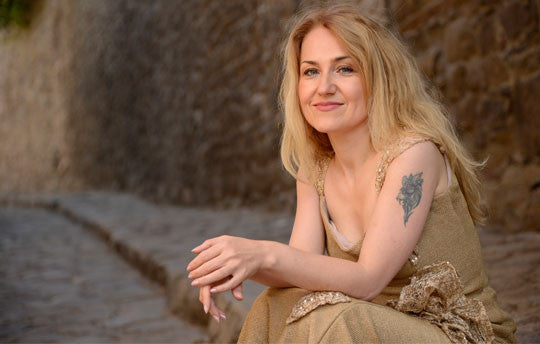Your Cart is Empty

From tales of revolutionaries and a mythical dragon-like creature, to the girl who confesses her fears to a rose bush, Eugenia Georgieva delivers an innovative and beautiful exploration of the joys and sorrows of Bulgarian folk song.
'It sounds gloriously Bulgarian' Evening Standard
'Meaningful and real' PopMatters
'It's breathtaking' fROOTS
Available now on CD, Download and with Subscription
Eugenia Georgieva grew up in Bulgaria’s second city, Plovdiv. But the seeds of her love for the country’s folk music were sown in Blazhievo, her mother’s home village at the foot of Rila Mountain where she performed at festivals as a child and encountered the authentic diaphonic singing of the old Shoppe women. Moving to London, Eugenia continued her exploration of Bulgarian folk song with a cappella vocal groups Perunika Trio and Yantra, and now Po Drum Mome takes her even deeper into the music.
For centuries, songs have been an indelible part of Bulgarian village life. People sang together when they worked on the fields or at evening gatherings, at big festivals and family celebrations, and the songs came down unwritten through the generations, long after composed Bulgarian music emerged in the 19th century. Even today, the past remains.
Eugenia discovered the song ‘Zmey Lyubi Moma’ when searching the Bulgarian Academy of Sciences archive for material from her mother’s village, and came across a field recording from the 1970s of the beautifully named Mira Galabova (“mir” – peace, and “galab” – dove), who turned out to be related to Eugenia’s mother’s maternal aunt. Zmey (a mythical dragon-like creature with feathers and a beard) was believed to have taken young maidens as brides if they hadn’t performed the Lazarki ritual – a rite of passage for young pre-pubescent girls transitioning into womanhood.
‘Gyul Devoyche’ eavesdrops, as a young girl and discloses her worries with a rose bush – she is in love with a young man but has been promised to an old man who will “take her posy” – the token of love. Love is a constant theme, of course, but it’s woven into the idea of the work which filled every day for rural people.
Death is the other great, looming constant, always lurking around the corner, sometimes thwarted, sometimes not. In ‘Trugnala Rada’, a tale for voice and kaval, a nightingale warns a couple not to drink from a spring because its water has been poisoned to kill the famous revolutionaries Hadzhi Dimitar and Stefan Karadzha. Even nature conspired in Bulgaria’s struggle for freedom and independence from the Ottoman Empire. And sometimes death can’t be denied: ‘Podzim Sam, Male, Legnala’ is a young woman’s dying confession, her heart breaking at the thought of leaving her firstborn son behind while her own mother mourns for the life that will not be lived. But out of death comes new birth, and on the album’s title track a girl calls along the road of life where black seeds bloom into scarlet blossoms in the eternal circle of life and death.
On Po Drum Mome the black seeds of history and tradition blossom today’s flowers. The joys and sorrows of these ancient songs are arranged with mostly traditional instruments to offer a sound that harks back to the Renaissance, and re-imagines it for a modern concert hall.